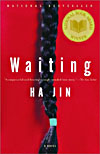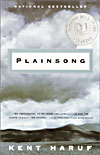
Comment
on this story
|
 |

When it hurts so good, you don't want the story to end
by Jeanne McDonald
Most people recoil at the idea of filing for divorce even once, but the hero of Ha Jin's novel Waiting (Vintage, $13) trudges off to the courthouse in Wujia Town 18 times before his request is finally granted. "Every summer," writes the author, "Lin Kong returned to Goose Village to divorce his wife, Shuyu." With this irresistible opening, Ha Jin hooks his readers for the long haul  as his hapless protagonist, a military doctor at an army hospital in Muji City, vacillates through nearly 20 years of guilt and ambivalence. Should he leave Shuyu, his simple country wife from an arranged marriage, to wed Manna, his determined and passionate military co-worker? Shuyu is devoted and hardworking, but Lin sees her only once a year during his annual 12-day vacation, and Manna is ever-present, young, and persuasive. as his hapless protagonist, a military doctor at an army hospital in Muji City, vacillates through nearly 20 years of guilt and ambivalence. Should he leave Shuyu, his simple country wife from an arranged marriage, to wed Manna, his determined and passionate military co-worker? Shuyu is devoted and hardworking, but Lin sees her only once a year during his annual 12-day vacation, and Manna is ever-present, young, and persuasive.
Because Ha Jin is such an accomplished writer, we feel compelled to sign on with Lin Kong in his quest for happiness, even though he, poor thing, is never quite sure where, or even whether, he'll find it. Yet the author manages to keep us turning pages when it seems that almost nothing is happening. When colleagues ask him about Manna, Lin says, "I shouldn't keep her waiting. She has to make her choice. I'm a married man."
"So you two broke up?"
"I think so."
All this hemming and hawing takes place during the Cultural Revolution, and gradually, it occurs to us that Ha Jin is actually building a political allegory through the passions of his characters. Lin and Manna meet during a forced military exercise, but it is at an opera about a military naval battle where they experience their deepest emotional pangs. When the hero shouts, "Down with Japanese Imperialism," the two clasp hands and look into each other's eyes. This militaristic atmosphere pervades every aspect of Lin's life, even when a judge at last grants the long-sought-after papers. "Although you two are divorced," he proclaims, "you are still comrades belonging to the same large revolutionary family."
Now a political exile, Ha Jin served in the People's Liberation Army but left China in 1985 to attend Brandeis University. After the government intervention at Tienanmen Square, however, he decided to remain in the United States. Although Waiting has won the National Book Award and the Pen/Faulkner Award, it has been banned in China. At the Southern Festival of Books in Nashville last October, Ha Jin told his audience that a Chinese reviewer objected to the pigtail on the cover illustration and to references of Shuyu's bound feet, claiming that such details portray China as a backward country, although these customs are still practiced in the provinces.
If all those years of waiting are ultimately disappointing for Lin Kong, at least the reader is amply rewarded for having stayed with him through this richly detailed and beautifully written novel.
Plainsong, by Kent Haruf (Vintage, $13) is a story spare in the way that a cello solo is spare—simple but soul-wrenching, its cadences rising and falling with the fortunes and misfortunes of the characters. Haruf has a marvelous capacity for painting characters in deft and radiant strokes and then crawling directly into their hearts. For example, the anxiety the young Guthrie brothers, Bobby and Ike, feel about their despondent mother is succinctly and  powerfully rendered in one simple scene: "Together they looked at the ceiling as if they could see through it into the dark guest room where the shades were drawn down night and day blocking out the light and all the world, as if they could see her lying motionless in the bed as before, alone and withdrawn into her sad thoughts." powerfully rendered in one simple scene: "Together they looked at the ceiling as if they could see through it into the dark guest room where the shades were drawn down night and day blocking out the light and all the world, as if they could see her lying motionless in the bed as before, alone and withdrawn into her sad thoughts."
Other characters who become intertwined in the lives of the boys and their father, Tom Guthrie, are also beautifully drawn: a pregnant high school girl; a lonely teacher; and two old bachelor brothers. Plainsong, which means a simple and unadorned melody, is appropriately musical in its conception. It is, in fact, one of those novels that makes your heart ache on one page and beat faster on another. But the characters, like the readers, also cherish the most fulfilling moments, as when, at the very end of the novel, Victoria and Maggie wait for the men to come in to dinner: "And soon, very soon now, they would call them in to supper. But not just yet. They stood on the porch a while longer in the evening air 17 miles out south of Holt at the very end of May."
You close the book reluctantly, unwilling for the story to end, because you are still so intimately wrapped in the events of the closing pages, still unable to let the characters go, even though, of course, you know it has to end some time.

March 15, 2001 * Vol. 11, No. 11
© 2001 Metro Pulse
|